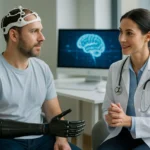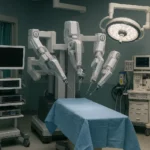Gene Editing: CRISPR’s Impact on Inherited Diseases
Inherited diseases, often passed through generations due to genetic mutations, faced important challenges for both patients and healthcare providers for a long time. While traditional remedies have largely focused on symptom management, they do not address the root cause of these diseases. However, gene editing technique, especially with progression in CRISPR-CAS9, is a new way to direct these genetic mutations directly. The CRISPR-CAS9 provides the ability to cure inherited diseases by targeting and modifying defective genes that cause these conditions.
In this blog, we will explore how CRISPR gene editing works, its application for inherited diseases, the challenges and ethical concerns, and why CRISPR could dramatically change the future of medicine.
Understanding CRISPR Gene Editing and Its Potential for Inherited Diseases
Genetic diseases are the conditions caused by mutations in a person’s DNA, often passed from one generation to another. Examples of such diseases include sickle cell anemia, cystic fibrosis and hemophilia. These conditions can significantly affect a person’s health and quality of life, often requiring long-term management or symptomatic treatment.
The effect of these diseases on individuals and families is sufficient. Many of these conditions cause lifelong health problems and may lead to premature death. In addition, traditional treatments for these conditions do not always provide a cure, which leads to dependence on lifetime remedies.
What is CRISPR-Cas9 Gene Editing?
CRISPR-Cas9 is a gene editing technology that is a landmark invention. It can permit scientists to make a whole bunch of adjustments at the atomic level of the DNA of an organism. The method is working using a guide (RNA) in which the Cas9 protein travels through the DNA to a certain place where it can cut the genetic RNA and rewrite it too.
The CRISPR-Cas9 system can edit DNA, making it crucial for treating diseases by restoring normal gene function. It eliminates the cause of genetic disorders by fixing DNA mutations.
Potential Applications of CRISPR in Treating Inherited Diseases
- Blood Disorders: These diseases, like sickle cell anemia and thalassemia, occur because mutations affect the genes that produce healthy hemoglobin.
- Cystic Fibrosis: This disease is due to a broken gene called CFTR. The lung and the digestive system are the disordered parts. CRISPR can be used to correct this gene.
- Hemophilia: Hemophilia is the body’s inability to clot the blood properly caused by mutations in clotting factor genes.
- Inherited Blindness: Gene mutations impair light-sensitive cells in the eyes, causing blindness that is passed down from one generation to another.
Gene Therapy and DNA Modification: A New Era of Treatment
Gene therapy is the direct modification of a patient’s genes to prevent or treat the disease. The traditional gene therapy has the drawback of failing to be efficient and accurate. However, the CRISPR-Cas9 technology broke these limitations into pieces. This technology can make precise alterations to DNA strands, which can then treat diseases caused by genetic mutations through gene therapy.
CRISPR gene therapy directly targets genetic mutations causing hereditary diseases, eliminating the need for regular treatments or symptom management.
CRISPR Gene Editing and Stem Cell Therapy: A Powerful Combination
Researchers can combine stem cell therapy, which regenerates damaged tissue or organs, with CRISPR gene editing to treat inherited diseases like cystic fibrosis, lymph disease, and visual abnormalities.
For instance, CRISPR is employed to transform patients’ stem cells and so follows the production of healthy cells which are after the transplantation yet imitated to the patient.
The Role of Genetic Counseling in CRISPR-Cas9 Treatments
- To all gene therapy, genetic counseling is an indispensable part of the treatment. By this act, patients are enabled to realize the specifics of the disorder they have. These patients also come to appreciate the pros and cons associated with using CRISPR as opposed to other options available.
- Easy to Use our moderators on Omegle without membership are actually influential.responsible for preserving your privacy and ensuring that you are anonymous.
Challenges and Ethical Considerations
- Birth defects that are off-target: CRISPR gene editing has a serious risk of unintentionally modifying the genome which can lead to unknown problems.
- The safety of a long-term: The knowledge of the long-term consequences of gene editing is still not complete. The concern is that CRISPR treatments may not always guarantee safety and could produce a harmful mutation over time.
- The germline switch: Editing germline cells (i.e., embryos) involves modifying genes that could pass to offspring.
- Accessibility: Certain regions may lack access to CRISPR treatments if they remain costly and highly specialized.
The Future of CRISPR and Gene Editing
- The future of CRISPR technology is incredibly promising. As research advances, CRISPR will evolve and likely extend to treating more genetic disorders, replacing symptomatic therapies with cures.
- In the future, we can use CRISPR in personalized medicine, targeting each patient’s specific genes. This will improve gene therapy efficacy and allow custom measures to address genetic disorders.
Why Should You Choose Regimen Healthcare?
- Expert Guidance: With Regimen Healthcare’s expertise, patients can access personal care and genetic treatments using CRISPR.
- Comprehensive Services: Regimen Healthcare offers a warm and friendly experience to all international patients from the first visit to the post-care check-up.
- Trusted Medical Network: By becoming the dear ones of hospitals and doctors from all over the world, we ensure that we can refer you to the very best care.
- Ethical Standards: We have transformed the health sector by involving patients in treatment choices and providing clear, transparent information.
How Regimen Healthcare Supports Your CRISPR Gene Editing Journey?
- World-Class Medical Infrastructure: India has many high-tech hospitals and research centers. Hospitals employ technologies like the gene-cutting tool CRISPR, which also treats patients.
- Affordable Healthcare: The quality of healthcare in India now makes people prefer the location, unlike earlier when health facilities were limited.
- As for CRISPR patients, the cost in India is about 30-40% lower than in other places. The reason why many medicals are after India is that hospitals have the highest quality of medical equipment.
- Experienced Specialists: CRISPR is one of these technologies, where skilled Indian experts help the patients to improve their genome.
Conclusion
CRISPR-Cas9, a promising technique for future gene therapy, may restore hope to millions suffering from genetic disorders. This breakthrough could overpower defective genes responsible for diseases, offering a permanent cure for conditions that have had no cure for centuries.
Although there are still a number of challenges and ethical problems, the future of gene providing with CRISPR looks positive. Hopefully, in a very short time, with the help of the research process, its implementation will improve the patient’s quality of life to a great extent so that they can be healthy and free from the problems of inherited diseases.
Do you or someone dear to you suffer from an inherited genetic disorder? Don’t hesitate to come to Regimen Healthcare. Our professionals will support you from start to finish, ensuring you receive the best treatment for your condition.
Frequently Asked Questions (FAQs):
Q1: What is CRISPR gene editing?
CRISPR-Cas9 is a technology that allows scientists to make precise, targeted changes to an organism’s DNA. It is a way to repair the genetic mutations responsible for inherited diseases.
Q2: Can CRISPR cure inherited diseases?
Although, CRISPR is the most potential way to correct the genetic mutations at the source and to achieve permanent cures for many inherited diseases.
Q3: How does CRISPR work?
CRISPR needs a guide RNA to point the Cas9 protein to a particular site in the DNA where it cuts and edits the genetic material. This terribly precise technology is able to fix malfunctioned genes.
Q4: Is CRISPR safe?
Clinical trials for CRISPR have shown success, although researchers have not yet fully tested its long-term effects. The research is continuous and the goal is to make the technology safe and accurate.
Q5: What are the ethical concerns with CRISPR?
The ethical part concerns whether off-target genetic changes could occur. It also addresses the long-term safety of gene therapy in germline cells and the potential effects of editing those cells on future generations.
Q6: Can CRISPR be used for all genetic diseases?
Even though CRISPR has been useful in treating some genetic disorders, it is still a necessity to continue and conduct research to prove its effectiveness in a wider range of diseases.
Q7: How is CRISPR used in gene therapy?
In disease treatment, CRISPR may directly intervene in the genetic codes causing disorders through gene therapy. This technology could potentially cure the patient permanently, rather than just relieving symptoms.






